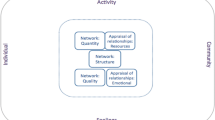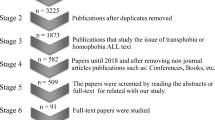Abstract
Employment has been highlighted as a determinant of health and as an essential milestone in the recovery process of people with serious mental illness. Different types of programs and public services have been designed to improve the employability of this population. However, there has not been much interest in the meanings attributed to these experiences and the negative aspects of work experience. In this research, we explored the meanings that participants attributed to their work experience and the impact of work on their recovery process. Research participants lived in Andalusia (Spain), a region in southern Europe with a high unemployment rate. Two versions of a semi-structured interview were designed: one for people who were working, and one for unemployed people. Participants’ narratives were categorized according to grounded theory and the analyses were validated in group sessions. Apart from several positive effects for recovery, the analysis of the narratives about work experience outlined certain obstacles to recovery. For example, participants mentioned personal conflicts and stress, job insecurity and meaningless jobs. While valid, the idea that employment is beneficial for recovery must be qualified by the personal meanings attributed to these experiences, and the specific cultural and economic factors of each context.


Similar content being viewed by others
References
Bartely, M. 1994 Unemployment and Ill Health: Understanding the Relationship. Journal of Epidemiology & Community Health 48: 333–337.
Bamberg, M. 1997 Positioning Between Structure and Performance. Journal of Narrative and Life History 7: 335–342.
Bauman, Zigmunt. 1997 Work, Consumerism and the New Poor. London: Open University Press.
Bebout, R., and Maxime Harris. 1995 Personal Myths About Work and Mental Illness: Response to Lysaker and Bell. Psychiatry 58: 410–404.
Benach, Joan, A. Vives, M. Amable, C. Varoelen, G. Tarafa, and C. Muntaner. 2014 Employment: Understanding an Emerging Social Determinant of Health. Annual Review of Public Health 35: 229–53. doi:10.1146/annurev-publhealth-032013-182500.
Bevan, Stephen, Jenny Gulliford, Karen Steadman, Tyna Taskila, Rosemary Thomas, and Andreea Moise. 2013 Working with Schizophrenia: Pathways to Employment, Recovery & Inclusion. Lancaster: The Work Foundation.
Boardman, Jed, Bob Grove, Rachel Perkins, and Geoff Shepherd. 2003 Work and Employment for People with Psychiatric Disabilities. The British Journal of Psychiatry 182: 467–468.
Burnard P. 2004 Writing a Qualitative Research Report. Nurse Education Today 24: 174–179.
Clarke, Adele E. 2005 Situational Analysis: Grounded Theory After the Post-modern Turn. Thousand Oaks, CA: Sage Publications.
Davidson, Donald. 2001 Subjective, Intersubjective, Objective. Oxford: Clarendon Press.
López, Marcelino, Margarita Laviana, and Sergio González 2010 Rehabilitación laboral y programas de empleo. In Pastor, A., A. Blanco, D. Navarro (Eds.) Manual de rehabilitación del trastorno mental grave, pp. 511–537. Madrid: Síntesis.
López, Marcelino 2010 El empleo y la recuperación de personas con trastornos mentales graves. La experiencia de Andalucía. Revista Norte de Salud Mental 36: 11–23.
Lucius-Hoene, Gabriele, and Arnulf Deppermann. 2002 Rekonstruktion narrativer Identität. Opladen: Leske. Budrich.
Luhrmann, Tanya Marie. 2007 Social Defeat and the Culture of Chronicity: Or, Why Schizophrenia Does so Well over There and so Badly Here. Culture, Medicine and Psychiatry 31: 135–172.
Lysaker, Paul, and C. France. 1999 Psychotherapy as an Element in Supported Employment for Persons with Severe and Persistent Mental Illness. Psychiatry 62: 209–221.
Lysaker, Paul., Morris D. Bell, W.S. Zito, and S.M. Bioty. 1995 Social Skills at Work: Deficits and Predictors of Improvement in Schizophrenia. Journal Nervous Mental Disorder 183: 688–692.
Markus, H. Rosel., and Shinobu Kitayama. 1991 Culture and the Self: Implications for Cognition, Emotion, and Motivation. Psychological Review 98: 224–253.
Marwaha, Steven, and Sonia Johnson 2005 Views and experiences of employment among people with psychosis: A qualitative Descriptive Study. International Journal of psychiatry 51: 302–316.
McGurk, Susa R., and Kim. T. Mueser. 2004 Cognitive Functioning, Symptoms, and Work in Supported Employment: A Review and Heuristic Model. Schizophrenia Research 70:147–173.
Mezzina, Roberto, Larry Davidson, Marit Borg, Izabel Marin, Alain Topor, and Dave Sells. 2006 Social Nature of Recovery: Discussion and Implications for Practice. American Journal of Psychiatric Rehabilitation 9: 63–80.
Myers, N. Laurenzo. 2010 Culture, Stress and Recovery from Schizophrenia: Lessons from the Field for Global Mental Health. Culture Medicine and Psychiatry 34: 500–528.
Patton M. Q. 1990 Qualitative Evaluation and Research Methods (2nd ed.). Newbury Park, California: Sage.
Ramsay, C. E., T. Stewart, and M. T. Compton. 2012 Unemployment Among Patients with Newly Diagnosed First-Episode Psychosis: Prevalence and Clinical Correlates in a US Sample. Social Psychiatry and Psychiatric Epidemiology 47: 797–803.
Ruggieri, M., M. Leese, G. Thornicroft, G. Bisoffi, and M. Tansella. 2000 Definition and Prevalence of Severe and Persistent Mental Illness. The British Journal of Psychiatry 177: 149–155.
Ryan, Gery W., and H. Russel Bernard. 2003 Techniques to Identify Themes. Field Methods 15(1): 85–109
Saavedra, Javier. 2009 Schizophrenia, Narrative and Change: Andalusian Care Homes as Novel Sociocultural Context. Culture, Medicine and Psychiatry 33:163–184.
Saavedra, Javier, Marcelino López, Sergio González, Samuel Sánchez, and Paul Crawford 2015 Cognitive and Social Functioning Correlates of Employment Among People with Severe Mental Illness. Community Mental Health Journal. doi:10.1007/s10597-015-9874-4.
Saavedra, Javier, Mercedes Cubero, and Paul Crawford. 2009 Incomprehensibility of Narrative of People Diagnosed with Schizophrenia. Qualitative Health Research 19: 1548–1558.
Saavedra, Javier, Mercedes Cubero, and Paul Crawford. (2012) Everyday Life, Culture, and Recovery: Carer Experiences in Care Homes for Individuals with Severe Mental Illness. Culture, Medicine and Psychiatry 36: 422–441
Sabogal, F, G. Marín, R. Otero-Sabogal, B. V. Marín, and E. J. Perez-Stable. 1987 Hispanic Familism and Acculturation: What Changes and What Doesn’t? Hispanic Journal of Behavioral Sciences 9: 397–412.
Gauri N. Savla, Lea Vella, Casey C. Armstrong, David L. Penn, and Elizabeth W. Twamley. 2013 Deficits in Domains of Social Cognition in Schizophrenia: A Meta-analysis of the Empirical Evidence. Schizophrenia Bulletin 39: 979–992.
Selten, Jean-Paul, Elsje van der Ven, Bart P. F. Rutten, and Elizabeth Cantor-Graae. 2013 The Social Defeat Hypothesis of Schizophrenia: An Update. Schizophrenia Research 39: 1180–1186.
UK Government 2007 Welfare Reform Act. http://www.legislation.gov.uk/ukpga/2007/5/contents.
Warner, Richard., and James Mandiberg. 2006 An Update on Affirmative Businesses or Social Firms for People with Mental Illness. Psychiatric Services 57: 1488–1492.
Funding
This study was conducted thanks to the financial backing of the European Social Fund of the European Union and the Andalusian Employment Service of the Regional Government of Andalusia (Cod: 2006000910)
Author information
Authors and Affiliations
Corresponding author
Ethics declarations
Conflict of Interest
All authors, Javier Saavedra, Marcelino López, Sergio González y Rosario Cubero declare that they have no conflict of interest.
Ethical approval and Informed Consent
All procedures performed in this article involving human participants were in accordance with the ethical standards of the institutional and/or national research committee and with the 1964 Helsinki declaration and its later amendments or comparable ethical standards and Informed consent was obtained from all individual participants included in the study. This article does not contain any studies with animals performed by any of the authors.
Annex
Annex
Semi-structured interview for the analysis of work experiences in people with severe mental disorders.
(Version for people who have worked in the past but are now unemployed)
-
Name:
-
Age:
-
Working time:
-
Time unemployed:
-
Diagnosis:
-
Province:
-
Interview number:
-
Education Level:
-
I would like you to concentrate and remember the day you started working for the first time. Tell me, how did you start work? What people or institutions helped you and how did you get the job?
Organization and structure of daily life
-
What changed in your life the day you started working? What are the differences between your life when you were working and now that you do not work?
-
Has your schedule changed since you stopped working? Have you had a hard time getting used to not working?
-
How has being unemployed affected your ability to do your shopping?
-
Has the amount and type of people you mix with changed much since you’ve been out of work? For example, have your type of friends changed?
Meaning of working and becoming unemployed
-
Do you remember what it meant to you when you started working? Did starting to work change what you thought about yourself? Did you notice that people, family or friends, thought of you or behaved differently with you when you started working?
-
Do you remember what it meant to you when you lost your job? Did being unemployed change what you thought about yourself? Did you notice people, family or friends, thinking about you or behaving differently to you when you were made unemployed?
Labour-Health-Stress
-
How did starting to work affect your health, particularly your mental health? (Explore problems related to stress, cognitive problems and the use of services)
-
How did stopping work affect your health, especially your mental health? (Explore problems related to stress, cognitive problems and the use of services)
Job Search
-
You’d like to find a job, wouldn’t you? What are you doing to find a job?
-
What people or institutions are helping you to look for work?
-
Imagine for a moment that you find a job, could you describe what would be a good job for you? Would it be different from the job or jobs you have already had?
-
Can you imagine any negative effects that working could have on your life? Could you tell us about them? And any positive effects of becoming unemployed?
Would you like to add anything else?
Rights and permissions
About this article
Cite this article
Saavedra, J., López, M., Gonzáles, S. et al. Does Employment Promote Recovery? Meanings from Work Experience in People Diagnosed with Serious Mental Illness. Cult Med Psychiatry 40, 507–532 (2016). https://doi.org/10.1007/s11013-015-9481-4
Published:
Issue Date:
DOI: https://doi.org/10.1007/s11013-015-9481-4




